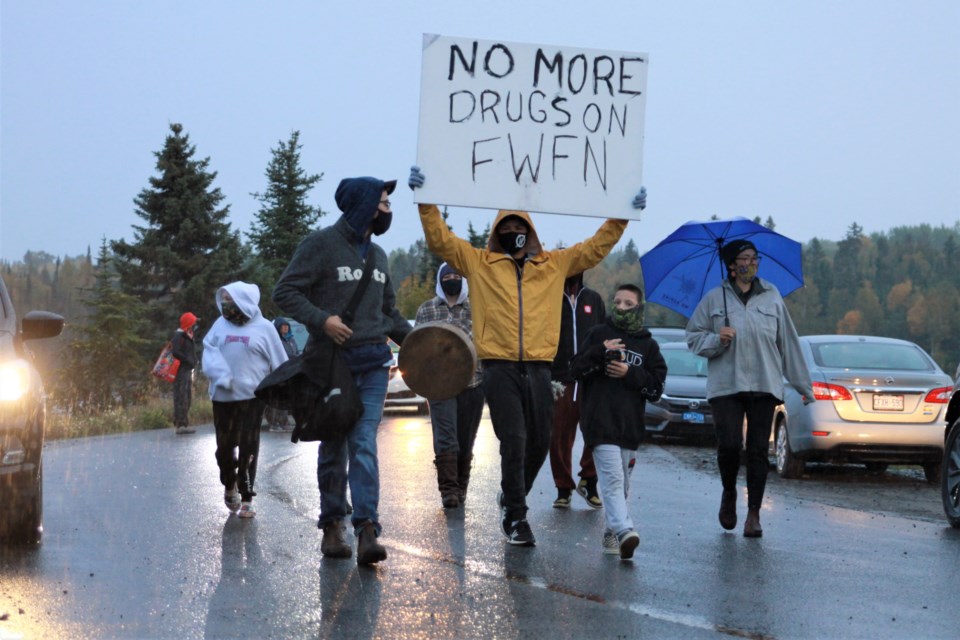FORT WILLIAM FIRST NATION – Beau Boucher-McLaren hadn’t planned to start a movement when he walked out of his house on Fort William First Nation one evening late last week, bearing a hastily painted sign reading “No more drugs on FWFN.”
The firefighting student simply reached a breaking point, he says, after too many years of seeing the toll drugs and addiction were taking on his community.
“I just started walking down my reserve,” he explains. “About 20 minutes into the walk, there were 2 people with me; by the end of the walk, I had 12. The next day I put a call out [to] meet at the band office, and there were 50 or 60 people there.”
A video of that walk generated a strong reaction, garnering around 5,000 views on Facebook by Sunday. Numerous community members have since rallied around the cause, participating in several walks and engaging in discussions over social media.
Even as rain came down Friday evening, over two dozen community members joined in for about a one-hour walk through a section of the community near Brule Bay.
Boucher-McLaren sees those as hopeful signs there could be a critical mass of people ready to see action on what he describes as a crisis for the First Nation.
“I see addiction all over my community – it’s rampant,” he says. “There’s drug dealers on every street. You can’t get away from it – it’s in your face everywhere you go, whether it’s seeing a loved one suffering from addiction or finding dime bags or needles on the side of the road.”
His goal is to start a dialogue that will ultimately get drugs off the reserve and see greater supports in place for those looking to heal from addiction.
The issue is personal for Boucher-McLaren. He only recently opened up to those close to him about how drugs affected his own childhood, he says, while addiction has hit several close friends and family members.
His cousin, who had struggled with alcohol addiction, passed away in August.
“I don’t feel like there was enough supports for him to be able to overcome his addiction,” Boucher-McLaren says. “We’ve recently lost people in our community who I think needed more support. That’s where we’re failing as a community.”
Fort William First Nation chief Peter Collins says he’s glad to see the nascent movement gather momentum. A message of support was recently posted on behalf of the First Nation’s chief and council on its official Facebook page.
The proximity of the reserve to Thunder Bay offers easy access to black market drugs, Collins says.
“We’ve been battling that for quite some time in our community,” he says. “We’re in no different position than anybody else. It’s a challenge in the world today – you see it all across the country and all around the world.”
There are no easy solutions, the chief says, but if it continues to resonate, he believes the movement Boucher-McLaren started could help spur greater action.
“It gives the chief and council some strength behind the decisions they do make,” he says. “If the community’s not on board, any decision we make around dealing with drugs will go nowhere.”
For Boucher-McLaren, seeing more support services available on reserve – in particular, an after-care facility for those returning from rehabilitation – is near the top of the list of answers to the crisis.
“There’s nothing for when people are sober and they come back home,” he says. “It’s just drugs and people hiding from drugs.”
Collins agrees the lack of access to treatment leaves many who seek help falling through the cracks. Federal funding available for those kinds of programs is limited, he says, making it a challenge for the First Nation to launch its own services.
“Even if you want to go into a treatment program, it’s a challenge to get in, because they’re full,” he relates. “If you go to a treatment facility, where do you go when you come back home? There needs to be that safe place for these folks to continue their rehabilitation.”
Boucher-McLaren has begun fundraising for supports like an after-care facility online and with jars in several local gas stations.
The walks have caused their share of friction on the First Nation, with some community members raising concerns online over the perceived targeting of drug users and rhetoric calling to get drug dealers off the reserve.
Boucher-McLaren accepts some of the criticisms, saying he’s learning through discussions with community members to eliminate terms like “addicts” and “drug dealers” from the vocabulary of the movement.
“I’m not sure we could actually get drug dealers off the reserve, per say,” he says. “Those are our family members, and we love them too. We have to remind ourselves that they’re people and they deserve sympathy as well. They’ve been through the same struggles that we have, and they just have different coping mechanisms. The drug dealers definitely need to stop pushing it into the community, though.”
The band council has little authority to remove members of the First Nation, Collins says, even if they may be bringing illegal drugs into the community. He also points to a shortage of officers with Anishinabek Police Services as a barrier to addressing the issue through enforcement.
“If they don’t belong here, it’s easy for us to deal with it,” he says. “But if they live in our community and have families here, it’s a little more challenging. That’s the tough part for us.”
Boucher-McLaren plans to continue the walks, hoping to hit every street on the First Nation and continue building the conversation.
As to what comes next, he’s not entirely sure – but one thing he’s certain of is that inaction is no longer an option.
“Something’s gotta happen,” he says. “We can’t just sit around and wait.”
